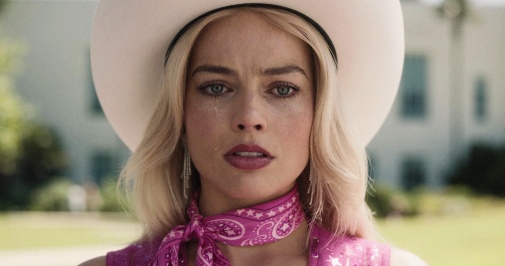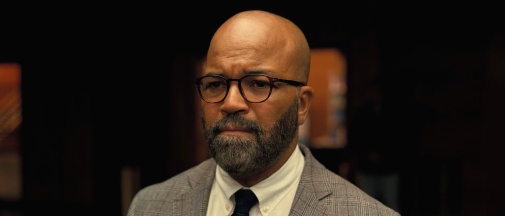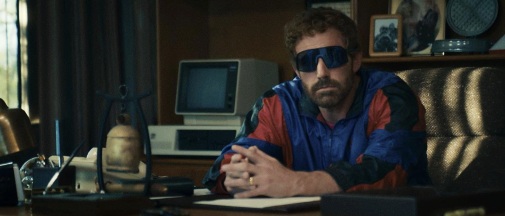"Barbie" Gets Pushed to Adapted Screenplay
 Wednesday, January 3, 2024 at 4:30PM
Wednesday, January 3, 2024 at 4:30PM  Shed a tear for Andrew Haigh's Oscar hopes.
Shed a tear for Andrew Haigh's Oscar hopes.
What many believed was bound to happen finally did. Despite Warner Bros. campaigning Barbie's script as original, an Academy committee formed by members of the Writers branch - Howard A. Rodman and Dana Stevens took precedence as governors, while Eric Roth recused himself - and chose to uphold the usual rules for IP-based material. That means Greta Gerwig and Noah Baumbach will have to compete in Best Adapted Screenplay, shaking up the race in a big way. The pink fantasy was the assumed frontrunner in the other category, facing off against The Holdovers as its biggest competition. Now, it's up against a veritable battalion of Best Picture contenders, including titles wrestling for the honor of nomination leader – Killers of the Flower Moon, Oppenheimer, and Poor Things…

But there's also American Fiction, a likely nominee with a narrative swirling around a writer's crisis in both personal and professional circles. Nathaniel has it at his number one prediction, as locked as Nolan and Lanthimos' pictures. But Barbie seems sure to get that golden lock, too, making it a race between heavy hitters with little to no space for surprise. Gerwig's ascendance spells doom for Andrew Haigh's queered-up version of Taichi Yamada's ghost story, Jonathan Glazer's minimalist take on Martin Amis' The Zone of Interest, and Kelly Fremon Craig's Are You There God? It's Me, Margaret. Shed a tear for them, whose chance depends on the branch contradicting the season's assumed trajectory. They've done it in the past, so hope remains, faint as it might be.
In Best Original Screenplay, Barbie's absence leaves a power vacuum that can benefit either longshots beyond the Best Picture race or some big names. The Holdovers now consolidates its frontrunner status, while Past Lives and Anatomy of a Fall get ever closer to lock status. May December is one of the most talked about screenplays of 2023, but is it too risky for the Academy's taste? Maestro could secure another nod for its multi-hyphenated star and even become a surprise threat for the win if he gets snubbed elsewhere. Air, Saltburn, and The Iron Claw are other possibilities, lurking in the shadows, waiting for the opportunity to pounce and stake their claim on one of the five slots.

The guilds could shed light on this. Not the Writers Guild, however, since they've moved their nominees will be announced after the Oscars have had their say. The same goes for the ceremony proper, denuding them of their so-called precursor fame. This is a consequence of the strike of course and, either way, Barbie was deemed original by the guild. Some may disagree, but I love this voluntary repudiation of the awards timeline, announcing the WGA's value beyond the Oscar race. Hopefully, this will mean their choices are bolder than usual or, at the very least, less in step with the Academy's taste. Perhaps they can become a place to honor the great screenplays AMPAS overlooks. Time will tell.
How would you categorize Barbie? Original or Adapted?



Reader Comments (17)
Honestly the dumbest rule. I'm proud of Barbie for insisting that it's an original screenplay - even if it was primarily motivated by odds of winning.
I mean - how is the leap of imagination required to write Barbie different than the leap of imagination required to write May December, which is clearly inspired by actual events.
Both are original screemplays.
Mike in Canada -- I completely agree with everything you stated. It's an absurd rule. Same goes for the fact that all sequels are automatically considered adapted, even if they are original stories following original material.
Barbie has always been Adapted to me, possibly because I'm so used to the Academy's rules, but also because of the fact that Barbie has had her own comic book series, video games, TV specials, books, movies (see Toy Story 3), what have you, since the '60s.
Just like Batman.
Or, to put it another way, the idea's not Original.
Frank Z - do you consider Maestro, Air and The Iron Claw original? Books gave been written about these characters, they've all appeared on TV, the plots of their films are less "original" than the plot of Barbie.
Honestly asking, since I have trouble making sense of the rule. Batman feels a bit different when the movie plots are based on the plots of previously written graphic novels.
This clears the way for The Holdovers to at least walk away with 2 Oscars.
@ Mike in Canada
I see what you did there, with these biopic or biopic-adjacent films. Still, I consider Maestro, Air and The Iron Claw all Original Screenplays, even if I might not necessarily consider the films themselves "original." ;-)
The main difference is that, to use Maestro as an example, Leonard Bernstein's not a fictional character created by someone else, previously exploited in various media (including film) and being adapted for this film by Bradley Cooper and Josh Singer. But Barbie is.
I also see that it can sometimes be a bit arbitrary, much like comedy vs. drama and leading vs. supporting.
Isn’t the rule (or used to be) “based on material previously produced or published”? There is no existing story of a Barbie doll entering the real world to discover the patriarchy, hence it is original. Don’t see how anyone could argue otherwise. An existing play, book, graphic novel, etc would be different.
Original or adapted - and the correct category is adapted - , it doesn't deserve a nomination.
In fact, the screenplay is badly written ...
This movie has a lot of problems, but no one is so awful and terrible than its weak screenplay.
The way I understand it, it all boils down to those two magic letters in the entertainment world: IP... if it's derived from something that was already an established IP, it's adapted, full stop. Say what you will about the story that Greta Gerwig and Noah Baumbach created for these characters, it was still a story written for a group of characters who are an established IP owned by a big corporation, and that seems enough for the Academy to classify it as adapted (which is probably the same reason why all sequels are deemed Adapted, and why true stories are only considered adapted if they're taken from a specific published source).
All that aside, I'm really hoping Barbie misses the nomination. Yes, it's wildly inventive and Greta and Noah will have my eternal admiration for Lady Bird and Marriage Story respectively, but the screenplay for Barbie never coheres. It's a mess of ideas that succumbs to speeches to tie things together, and while I think the set design, the atmosphere and the performances do a lot to ultimately carry it through, I don't think the screenplay should be rewarded for that.
Of course, it wouldn't be the first time a screenplay is nominated more for its idea than for its execution... or even won.
The Academy is correct, and it's not even close. Good for them.
Odd that they are so strict about screenplay categorization yet will permit anyone to call themselves a supporting actor!
(I know they're governed by different branches, but it's a little silly.)
Now beating the drum for Ryan Gosling to be Barbie's big Oscar win.
When I think of Barbie, I immediately think of Gosling,Gerwig, the design.
When I think of Oppenheimer, I think of Nolan, the craft, Cillian.............................Downey Jr way down the line.
Looks like the same ball was just dropped on Ava Duvernay's ORIGIN whose award's prospects seem a tad more bleak than BARBIE (and their reasoning for Original vs. Adapted slightly more dubious as well).
This makes sense. I suspect Barbie will score a nomination here. It's actually a fairly impressive work of adaptation given how much they had to work with and included.
However, I'd love to see Scorsee and Roth get nominated and win here. By flipping the story, and refocusing it on the Osage and Leo's character, they really add a powerful dimension to the story that wasn't as present in the text.
I think Cord Jefferson is really hot right now. It feels like, at this point, he could win (just like Emerald Fennell and Florian Zeller did).
I really hope this means that May/December is now a lock for a nomination.
Frank Zappa -- I'm not trying to be argumentative; I'm just curious. How would you classify such works as Todd Haynes' hyper-referential cinema?
Are VELVET GOLDMINE and I'M NOT THERE adapted because they use a bunch of pre-existing texts, including works from the artists they're portraying - even if by another name in the first case? And what about FAR FROM HEAVEN? From its aesthetic to the writing, it's a riff on Douglas Sirk films, borrowing heavily from ALL THAT HEAVEN ALLOWS in particular. Hell, Patricia Clarkson is basically playing Agnes Moorehead's character. Aren't the specificities there even more connected to a past work than the concept and aesthetic of BARBIE?
Personally, I'd consider all those works original, and the Academy nominated FAR FROM HEAVEN as an original screenplay. Yet, I can see an argument for them being adapted if I apply the same idea that you point to BARBIE's categorization.
I guess a fixed rule regarding credits could be put in place. BARBIE does include a "based on" credit, so it'd go adapted. Of course, this doesn't cover many films that are clearly adaptations, but it isn't mentioned in their credits. CLUELESS, for example.
"IP... if it's derived from something that was already an established IP, it's adapted, full stop. Say what you will about the story that Greta Gerwig and Noah Baumbach created for these characters, it was still a story written for a group of characters who are an established IP owned by a big corporation, and that seems enough for the Academy to classify it as adapted (which is probably the same reason why all sequels are deemed Adapted, and why true stories are only considered adapted if they're taken from a specific published source)."
Richter Scale,
You explained perfectly.
I couldn't make it better.
Thank you so much.
@ Cláudio
You end with Clueless, but that’s where I might have started. There’s a strong argument to be made that Heckerling‘s script is an adaptation of Emma. (The name of the WGA category she was nominated for, “written directly for the screen,” is a little misleading since no film scripts, original or adapted, are written “indirectly” for the screen.) As for Haynes, what you say could equally apply to Tarantino, but homages, pastiches, deconstructions, light plagiarism and/or simply being derivative are all gray areas. The screenplays of Velvet Goldmine (despite Citizen Kane reference) and I’m Not There are clearly Original to me; Far From Heaven, on the other hand, is tricky…but maybe it’s because I’m overly familiar with the Sirk oeuvre.